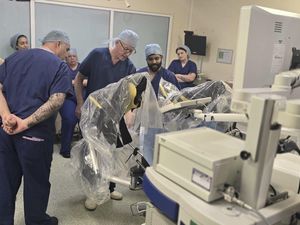Obesity on the rise among Black Country youngsters
Almost 13 per cent of children in parts of the Black Country are obese by the time they go to school, shocking new figures have revealed.

The supersize youngsters put Wolverhampton near the top of the national 'fat league'. Similar figures have been reported across the Black Country.
And when the children are ready to leave primary school, around a quarter of them are obese.
The figures have been condemned by health bosses. In Wolverhampton 12.7 per cent on reception school pupils are obese, one of the worst in the country behind a handful of London boroughs and northern areas including Liverpool.
The national average is just over nine per cent, but all of the Black Country areas are above it.
The 2012/13 data shows that 11.5 per cent of Walsall's four and five year olds are obese, with the number dropping slightly in Dudley to 11.2 per cent and 10.9 per cent in Sandwell.
In Staffordshire the number drops to 9.7 per cent.
Calls have been made for the issue to be highlighted and be taken as seriously as smoking as a threat to people's health.
Wolverhampton's Director of Public Health, Ros Jervis, said Wolverhampton City Council was introducing a range of features to tackle obesity.
She will use this year's annual public health report as a 'call to action' about the issue.
She said: "Obesity is a significant health issue in Wolverhampton, particularly among our young people, and this can have a major impact on their lives – both in terms of their health and their quality of life.
"We're determined to do all we can to combat the problem, and we've introduced or are continuing a number of services which will help children who are overweight, or prevent obesity in the first place."
"I will be using the forthcoming publication of my Public Health Annual Report as a call to action for organisations, businesses and individuals to team up and help tackle the problem, which includes addressing some of the issues caused by modern life such as sedentary lifestyles and excessive consumption of high calorie foods.
"It will not be a quick fix – but we know that by getting organisations like the NHS, the city council, businesses and the voluntary sector to work together with communities, individuals and parents and families, we can tackle the problem."
By year 6 the figures get higher still.
Sandwell tops the obesity league for 10 and 11 year olds, with 24.3 per cent of its children classed as obese.
Wolverhampton is marginally behind on 24.1 per cent, ahead of Dudley on 23.4 per cent and Walsall on 23 per cent, with Staffordshire healthier on 18.6 per cent.
To combat the issue in Wolverhampton a free swimming programme for under 16s has been introduced, while pupils are encouraged to eat more fruit and veg through the Food Dudes programmes.
The council has also established more than 20 outdoor gyms which are free to use and located in parks around the city.
Dr Mitch Blair of the Royal College of Paediatrics and Child Health, said of the figures: "The fact that there are children starting school overweight or obese is real cause for concern.
"We need to start taking the obesity epidemic as seriously as we take other public health threats, such as smoking."
Tam Fry of the National Obesity Forum added: "In deprived areas there are swathes of families on low incomes who cannot support their children. In some families there is no tradition of exercising, so the children just slump in front of the television.
"Or the parents can't cook because they haven't been educated at school.
"The consequence is that these children get fatter."
The government has estimated obesity costs the NHS £5 billion a year.
And it is feared this figure would rise to as much as £50 billion by 2050 if action is not taken soon to tackle the growing problem.
Government campaigns have been launched including Change 4 Life, which advises people to make small food changes to help aid their health.
And more children are being encouraged to walk to school to help hit the target of an hour's physical exercise each day.





